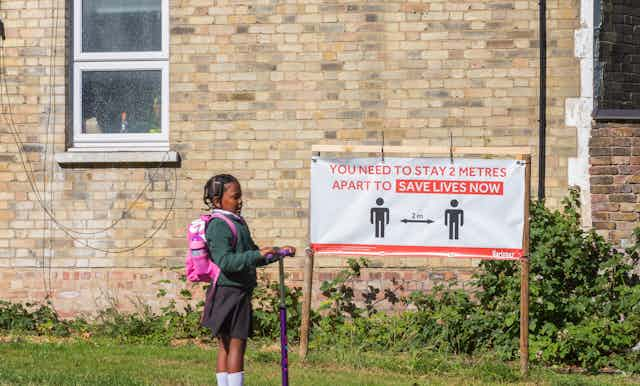Trust is a crucial component of effective public health policy. It is also a two-way street. People need to trust the authorities – universities, employers, the government – that are asking them to behave in a certain way, but they also need to feel trusted by these authorities. The success of various authorities when it comes to managing the coronavirus pandemic relies on how effective they are at building and maintaining bonds of trust with the public.
One recent example of how this trust can break down are the fences erected on November 5 around a student’s accommodation block at the University of Manchester. Students reported that the fencing left them with only one security-guarded exit point. Student protests led to fencing being pulled down, and it has since been removed.
The university has apologised for the “concern and distress caused” but will likely have left many students feeling powerless and distrusted.
The decision to cordon off “non-essential” items in supermarkets in Wales serves as another example. It implied a lack of trust in consumers’ ability to decide for themselves what constitutes “essential items” and was met with widespread disapproval.
Trust is key to motivation
Research has found that people who have the ability to make their own decisions are, in the long run, more likely to keep to COVID-19 guidelines than those whose decisions are controlled.
Also, a pre-print (not yet peer reviewed) research study of 51,000 UK adults suggests that not feeling trusted, in the form of not being given sufficient autonomy over certain decisions, is likely to reduce people’s motivation to keep to the guidelines.
At this point in the pandemic in the UK, taking actions such as imposing physical barriers without consulting the people involved might actually harm the public health effort. It reduces people’s trust, and therefore their motivation to adhere to guidelines and rules.

Actions such as this affect three of the basic psychological “needs” that shape human behaviour. They take away autonomy – the ability to make personal decisions. They deny competence – they are not given the information required to make decisions for themselves. They also lead to a lack of relatedness – a sense of belonging or connection.
Research is showing that the less these psychological needs are being met, the more damage it does to our sense of wellbeing during the pandemic. This could also be crucial to public health strategy.
Mental health is public health
As many organisations and authorities seek to balance public health and mental health, it is important to remember that the two are in fact interlinked.
Firstly, mental health is an important component of public health. For some time, mental health advocates and professionals have aimed to achieve a “parity of esteem” between mental and physical health: spreading awareness that the two are equally important.
Protecting people’s mental health will help them to stay motivated to keep to the COVID-19 measures. By positively affecting the overall control of the virus, this will then have net gains for public mental health as well as physical health. By contrast, people with anxiety and other mental health problems may lack the capabilities to continue sticking to measures, with correspondingly negative results.
Many organisations are introducing mental health and wellbeing initiatives such as websites and apps. But in some instances these paper over deeper cracks. For example, the pandemic is reflecting or even widening existing mental health inequalities – with people on low incomes, of Asian ethnicity and women among those particularly at risk of mental distress. It is important to not see organisational wellbeing initiatives as the solution to a problem they could, in some instances, help to prevent.
Reaction to organisations’ coronavirus practices is currently mixed. Some employees feel that they trust their employers more now. Others feel that their employers are failing to provide conditions where they have felt secure, connected or treated fairly during the pandemic.
Taking action
Where possible, organisations should encourage and support home working, rates of which halved from 40% to 20% between June and September. Resources should be allocated to foster communication, to ensure employees feel cared for, trusted and consulted over decisions that affect their health, and that of their colleagues.
Expanding access to professional mental health care is important to ensure that we do not see a repeat of the first wave, where a substantial proportion of those needing it were unable to access it.
In the case of universities, if the advice of organisations such as the Universities and Colleges Union and the scientific evidence had been followed, many students now reporting distress at being confined to campus accommodation would find themselves in family and community environments that often (although not always) would be better for their mental wellbeing.
Perhaps more worryingly, the protests over university fences and supermarket goods indicate that the social divisions we started seeing earlier in the pandemic are intensifying.
As the holidays and Christmas draws nearer, it is crucial that authorities and organisations focus on rebuilding trust. In September, public confidence in the UK government’s handling of the pandemic sank to its lowest since the pandemic began, and is lower than in many countries.
Organisational and political leaders have a key role to play in creating environments and conditions that help the country recapture the shared sense of togetherness, trust and solidarity that was apparent during the first lockdown.

